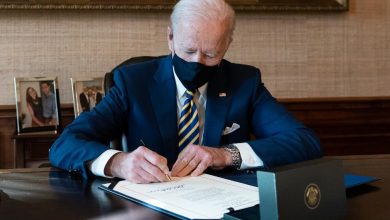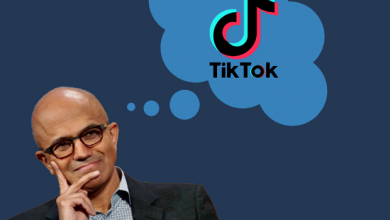Washington AG Bob Ferguson talks Trump, reining in Big Tech, and rumors of a gubernatorial bid
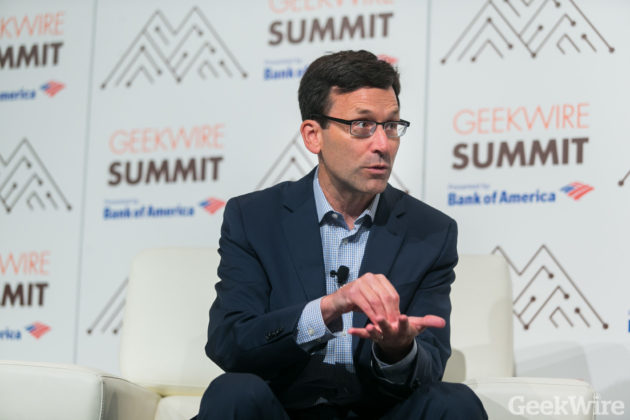
Over the past year, Bob Ferguson has stepped into the media spotlight by repeatedly challenging President Donald Trump on everything from environmental protection to immigration.
Immigration, in particular, has put Washington state’s attorney general on the tech industry’s radar. His lawsuit halted implementation of Trump’s first travel ban, with help from Seattle-area tech titans Amazon and Expedia. Ferguson is now suing the Trump administration over plans to let the Deferred Action for Childhood Arrivals (DACA) Act expire, once again enlisting help from the tech industry.
But Ferguson’s partnership with the tech industry is a complicated one. Throughout his career, he’s acted as a watchdog of Big Tech, suing companies like Julep and T-Mobile over consumer protection issues.
Ferguson explained how he walks that line during his talk at the 2017 GeekWire Summit.
“We’re all adults,” he said. “My view is to be straightforward and transparent about where I’m going and why I’m doing it, and to give folks a chance to respond.”
During the fireside chat, Ferguson also addressed rumors of his gubernatorial ambitions, whether he has an ax to grind against the president, and how his intensely competitive personality influences his work.
Listen to the full conversation in the player above, watch video of the talk below, download the conversation as an MP3, and continue reading for an edited transcript.
Monica Nickelsburg: That was a pretty powerful moment. I remember being there. It was very emotionally charged. It looked like you got a little bit emotional in the video, too. What was going through your mind in that moment? Why was this so important to you?
Bob Ferguson: First, thanks so much for having me here. I really appreciate the chance to chat about a few things going on in the office.
Well, it was a big moment. We were the first state to challenge the president, once his administration got started. A lot was riding on that decision by the judge for the many thousands of people trying to travel to our country or abroad. Any time you’re suing the president, there’s a lot at stake. I think we just all felt that. I do believe, and I tell my team this all the time: The law is a powerful thing. Behind every case we file, people’s lives are being impacted in often deeply personal ways. So I think we all felt that after the judge announced his decision, just a few minutes before that press conference.
Nickelsburg: President Trump is an unusual and unpredictable adversary.
Ferguson: Yeah.
Nickelsburg: What did you learn about him throughout that process, that maybe the general public doesn’t know?
Ferguson: Well, I’m not sure I have any great insights. What I can say is what our approach has been with the president, and that is that — I was surprised when he was elected president.
Nickelsburg: Don’t think you were the only one who felt that way.
Ferguson: Right. I confess: I didn’t see that coming. So, I made myself a promise after he got elected — I decided I would not underestimate him again. If he said he was going to do things during his campaign once he became president, I would prepare for those, I would assume he would try and execute on exactly what he talked about during the campaign.
One thing he talked about during the campaign was calling for a complete and total shutdown of Muslims coming to the United States. Those are his words. Our team began working, essentially after he was elected, to prepare for a Trump administration. I think that’s one thing I learned, not to underestimate him. Even though I may not understand why his approach works from a political standpoint — he got elected president, after all — that I decided we would prepare for him legally if he did things that we thought were unconstitutional.
I think the key thing is to be prepared for the unexpected, but also to take him at his word. If he says he’s going to roll back protections for Dreamers, assume he’s going to do that and prepare for it.
Nickelsburg: What did that preparation look like in terms of the travel ban? Did you have Amazon and Expedia on speed dial just ready to go?
Ferguson: Yeah, so it’s interesting. Of course, there was no executive order after he was elected, so we didn’t know exactly what it looked like. But we were having conversations about a potential executive order and being ready for it.
Once it was rolled out on a Friday evening, my team knew to go to work on it right away. Everybody was in the office that weekend, working hard. We wanted to file our complaint on Monday. One thing we talk about a lot internally, in my office, is that — as a lawyer, it’s important in every case to be telling a story. Yes, you’re using the law, you’re citing the Constitution, you’re citing statutes, but tell a story.
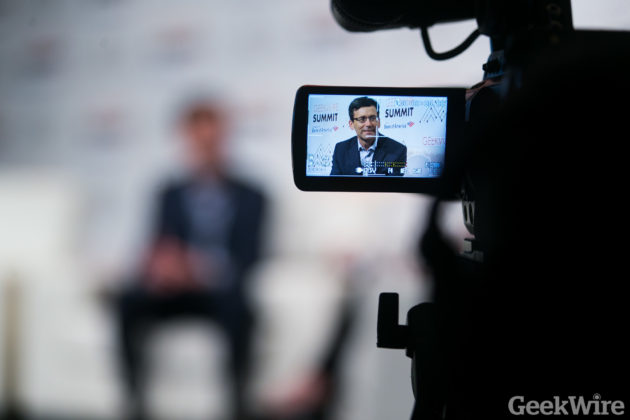
In talking about the case one story we wanted to tell was the adverse impacts to Washington businesses. That weekend — it was Sunday morning, I think — when we decided let’s reach out to the business community and see if they would file declarations in support of our lawsuit, talking about the adverse impacts of the travel ban on their businesses. The tech community in particular.
Literally Sunday morning, I remember my first call was to David Zapolsky, corporate counsel for Amazon. I’ve known David, worked with him over my time as Attorney General. I called him up and home and said, “Hey David, we’re thinking of filing a lawsuit against the president on the travel ban. Would you consider filing a declaration on behalf of Amazon?” He said, “Sure, when are you thinking of filing?” I’m sure he thought this is two or three weeks away. I said, “Well, we’re filing tomorrow.” There was a long pause on the phone, and David said, “Let me see what I can do.”
Amazon and Expedia were the two companies that — within 24 hours — had declarations as part of our complaint, and then more than 100 tech companies came on board in the coming weeks after that as the case went forward. To me, that was significant and important for telling our story of the impact not just on individuals, which of course is very important, but the broader community as well.
Nickelsburg: This has, as you mentioned, really become a flagship issue for the tech community, immigration. What do you think is going to happen to innovation and to the economy if the Trump administration’s immigration agenda is fully implemented? everything from DACA to the travel ban to increased border security. Looking ahead, if all of that goes through, what’s going to happen?
Ferguson: First, not all of it will go through. That first travel ban, we defeated it in court. The first travel ban, keep in mind, was unbelievably broad. It applied to everybody with a green card in this country. That’s 500,000 people. They could not travel back into the United States even though they had a green card, for God’s sake. So we were able to stop that. A more narrow version of the travel ban has been allowed to go forward with some limitations around it. I don’t think they’ll be successful with the Dreamers, in rolling back protections for Dreamers. But if, theoretically, this all goes forward, the impact for the tech industry is significant.
In the declarations that have been filed on our behalf, for our case on behalf of Dreamers and with the travel ban — over and over again, what we see in those declarations from tech companies is the adverse impacts on their recruitment and on their retention for organizations that are worldwide and global in their reach and scope. Having the president’s immigration vision being realized would, I think, have an adverse effect.
One more thing I’ll also emphasize is in some ways, just as bad is the uncertainty around all these issues. Where you never know what’s going to come out next. Tweets get put out there, sometimes very abruptly, and that, I think creates uncertainty within the business community generally and the tech industry specifically.
Nickelsburg: Abroad, too. If I’m an entrepreneur from another country, what’s going to make me come to the U.S. versus Canada? Do you think that this is going to encourage other countries’ entrepreneurial activity to spike and ours to decline?
Ferguson: I think that’s exactly right. In fact, I’m glad you mentioned the international community, because this morning I literally had an interview with a Dutch TV station. They came out to Seattle and sat down with me to talk about the work we’re doing against the Trump administration. Countries all around the world, they care deeply about what’s going on with these issues. It is certainly international in scope. My office has received thousands of letters from people all around the world. The community as a whole, around our world, I think is deeply concerned by what’s going on.
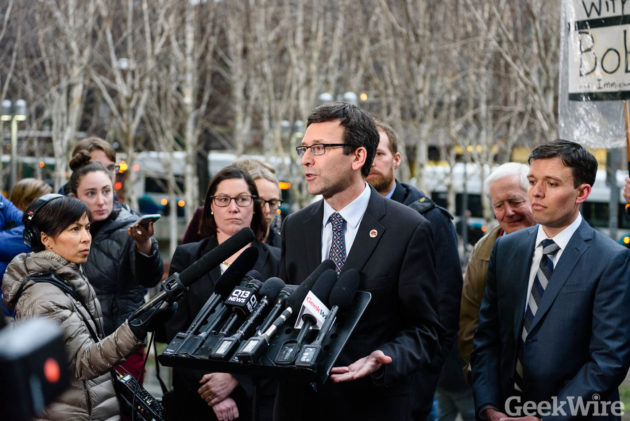
Nickelsburg: You’ve secured the first temporary restraining order on the first travel ban, that’s the video that we saw from the courthouse steps. It’s gotten kind of confusing. We’re now on travel ban 3.0. I cover this stuff and it’s confusing for me, so maybe you could briefly update us on where we are now. Is the Supreme Court going to hear travel ban 3? Is it indefinite?
Ferguson: Sure. In a nutshell, keeping it relatively simple, the first travel ban is the one that we filed right away. We won in the district trial court and we won at the court of appeals. At that point, the administration did not appeal that to the U.S. Supreme Court. So we won. In fact, we won to such an extent that I insisted that the federal government pay our cost for having to respond to their appeal to the ninth circuit court of appeals.
Nickelsburg: Are they going to?
Ferguson: They did, and I won’t confirm or deny whether that check is framed in my office. But it was important. The president talked about winning all the time, so much winning. They got their butts kicked. They did. They lost. And Judge Robart, who I mentioned — that’s a judge who was appointed by President George W. Bush. The ninth circuit court of appeals, three judges. Two judges appointed by Democratic presidents, one by a Republican. All four of those judges agreed with our arguments and shut down that travel ban.
They shut that down. The administration took five weeks and did a revised travel ban. Much more narrow in scope. I won’t go into the details, but much more narrow in scope. We challenged that, but now other states were getting involved. We were in court before Judge Robart again on the second travel ban, but literally, while we were in court, another federal judge in Hawaii granted an injunction for the state of Hawaii. That’s why on the second travel ban, we have somewhat ironically not been involved in that as it’s worked its way through the courts. That’s been Hawaii.
Each of those travel bans — and this is the one important point I would leave with on these three travel bans — is that the first two were limited in duration to 90 days and 120 days for the key portions of it.Those two have now expired. The first one was defeated, the second one expired. The third one is unlimited in duration. There is no ending point. It doesn’t say 90 days it’s over, or 120 days it’s over. It’s indefinite. It goes essentially as long as Donald Trump is president and wants it to continue. So There’s a lot at stake and my office is taking a look at it, so I don’t have anything to announce today on that.
Nickelsburg: Taking a look at it? Are we [Washington state] going to sue again?
Ferguson: Stay tuned on that one, yeah.
Nickelsburg: Okay. It sounds like you have some fans in the audience, but you now have nineteen lawsuits against the federal government. Sixteen as of yesterday, I think, are directly against the Trump administration. Correct me if I’m wrong, it’s a lot to keep up with.
Ferguson: Since Donald Trump became president, we have filed 19 lawsuits against the administration.
Nickelsburg: What do you say to people who just think you have an axe to grind against this guy?
Ferguson: I plead guilty. I do. I don’t know what to say.
More seriously, a couple of points. Four of those cases have gone through the court system. They’ve been determined. It’s not like I’m keeping score, but we’re 4-0. We’ve won all four of them. We’ve won all four. So, I am thoughtful about the cases we bring.
My criteria is pretty simple. The questions I ask my team — we have a weekly call, a weekly meeting. We’ll have another one in a few hours, where we talk about all things with this administration. Are Washingtonians being harmed? Do we have good legal arguments? Can I, as Attorney General, bring the lawsuit? If the answer to those questions are yes, yes and yes, I’m interested. I don’t anticipate we’ll win all of them moving forward, but a lot’s at stake with these cases.
One thing I’ll add to that. For the first travel ban case, obviously there’s a lot at stake for the individuals from those seven Muslim-majority countries. A lot’s at stake. But in that litigation, so much else was going on. Literally in their briefs, the federal government, the Department of Justice — your Department of Justice — in their brief, what they wrote was not just that the president has broad authority to issue an executive order, which he does. He has broad authority. What they argued in their brief was that that authority is un-reviewable by the federal courts. In their brief. That’s no slip of the tongue in oral argument. In their brief, they said, “Court, you can’t even look at this.” That’s breathtaking. Are we not a democracy? Do we not have a judiciary, separate branches of government?
My view was, look, that’s never been the law. It’s not the law now. I will not allow that to be the law. I’m just not going to let that happen. As a result, after they got defeated in the first travel ban, they walked that argument back. But that’s an example. What are the limits of presidential authority? There’s a reason why that first court case is taught in law schools, because it gets to the heart of what are the limits, if any, to a president when it comes to these really important issues.
Nickelsburg: You talked about keeping score — or not keeping score, I should say. I think it’s pretty common knowledge at this point that you’re a chess master, and there are tons of analogies out there about how your mind for strategy on the chess board translates to politics. But we have an inside scoop on another game where you’re also apparently a pretty formidable opponent. John Cook, our GeekWire co-founder, used to play soccer with you.
Ferguson: Yes.
Nickelsburg: And he said … I think his exact words were you were “like a bull out there.” He said that you used to wear these racketball-style glasses.
Ferguson: That’s true.
Nickelsburg: And it wasn’t necessarily about being the best player, but that you were just so focused and determined that nobody really wanted to go up against you. So I’m sensing a theme here. Does that inform everything that you do? How does it translate to your work in the law?
Ferguson: We are the way we are for whatever number of complex reasons. I’m one of seven kids, six boys, one long-suffering sister. It was a family where we played a lot of sports and a lot of driveway basketball. I’m on the younger side, I’m sixth of seven. And I knew if I wanted to play with my brothers, I had to compete. They weren’t coddling me as a younger brother — take my word for it. Whining got me nowhere. Their philosophy playing driveway basketball was: No blood, no foul. In other words, if you’re not bleeding, do not call a foul. We’re throwing elbows around here.
For whatever reason, my friends would tell you, I’m a very, very competitive guy. I cannot stand losing. It’s perhaps… I guess if I was to characterize myself, that maybe the quality that I may have too much of, in a way. But I just can’t stand losing in anything that I do. I really can’t stand it.
Nickelsburg: I no longer believe you when you said you weren’t keeping score about the Trump administration.
Ferguson: My theory is if you’re going to do something, you do it to the best of your ability. Full stop, that’s how you do it. The more that’s at stake, the more I feel that way. I was proud of my team that on Friday night that first executive order was signed. That weekend I said, “Can we file this thing Monday?” Take my word for it, to put together a legal complaint of that complexity and the declarations by Monday is an unreasonable ask, but we got it done and shut that thing down within a week. I think it’s important to be competitive. A lot’s at stake. But I guess I plead guilty to that as well, yeah. I’m a competitive guy.
Nickelsburg: I want to talk a little bit about privacy. These big tech companies like Facebook, Amazon, Google have so much information about us. I think consumers are starting to get anxious about it. We actually did an event survey before the summit, asking attendees what they wanted to know the most about, and privacy kept coming up. I’m curious; as governments start to look more closely at these companies, should there be more safeguards to protect us from how powerful they are?
Ferguson: I guess a couple thoughts. First, I think you’re right in general. We hear that back from the public, about deep concerns about personal information. The year before last, I proposed a bill to our state legislature that toughened up our laws around data breaches, for example.
Up until two years ago, if there was a data breach for a company, there was no deadline by which the company must notify consumers that their personal information had been compromised. There’s no deadline. Many other states have a deadline. That wasn’t the case here. No requirements to notify the Attorney General’s Office of such a thing. In fact, that law had not been updated for almost a decade. Technology has changed quite a bit in how to protect a company from data breaches.So we proposed a law to strengthen all those things.
We now issue an annual report based on the information we get about data breaches and the numbers. We’re about to issue our report here, I think in the next 24 hours, but the jump from last year — it’s almost doubled in terms of number of data breaches. More than doubled, in terms of number of consumers affected here in Washington state. So it’s a big concern. Our office is involved in cases, as you might imagine, and working with other Attorney Generals. I think it’s a challenging time from that perspective.
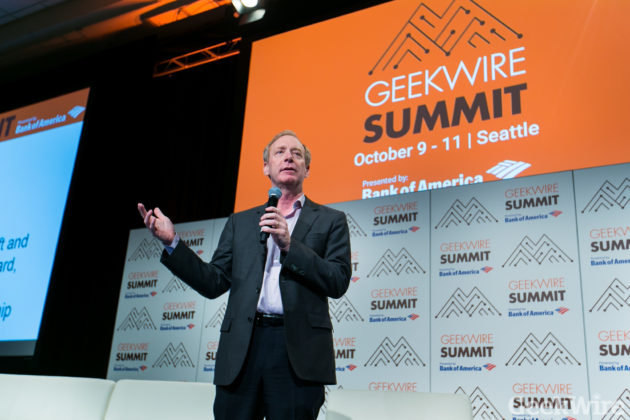
Nickelsburg: It kind of puts you in a tricky position, though. Because on the one hand, you’re partnering with these big tech companies like you did in the travel ban. But on the other hand, a big part of your job is protecting consumers. Those seem like they might be sometimes competing interests. How do you balance being a partner with the tech industry but also a watchdog?
Ferguson: It’s a good question, because that’s exactly right. We enforce our state consumer protection act. It’s very simple. If you engage in unfair or deceptive business practice, for example, we enforce that law. We have a big consumer protection division that does that.
Here’s the way I look at it: I believe in being upfront about what I’m doing. I believe in developing partnerships. I think the reason why Amazon and Expedia were willing to join us so quickly was: I knew those folks for a long time, leading up to the travel ban. If there was a problem, I’m going to let them know if we see something going on. We’re all adults. My view is to be straightforward and transparent about where I’m going and why I’m doing it, and to give folks a chance to respond to it. Yes, we wear multiple hats, but that’s just part of the job and I think people understand that.
Nickelsburg: Give us a preview of your 2020 gubernatorial campaign. What are going to be some of the key issues? They want to know.
Ferguson: Right. Folks should know, I’m happily married. My wife is a very, very — speaking of privacy — she’s a very private woman. No Facebook page. She’s as private as someone can be. I’m deeply committed to my kids, and I’m home with them this morning, getting them out the door to school. I’ll be home with them tonight to read Harry Potter to them. And I have a job where I can do those things and balance my life. I’ll make my decisions when the time comes, but we have a governor I respect and admire, Jay Inslee. I love the work that I’m doing.
And I will say this, that my view is that — and I said this when I was running for attorney general in 2012 — that the most consequential office in politics is attorney general. And people always gave me a funny look back in 2012, like what are you talking about? No one even knows what the AG does. No one gives me a funny look anymore when I say that. People understand how consequential that office is. I like being a lawyer, I like being the largest, best law firm in the state. So that’s really what I’m focused on right now.
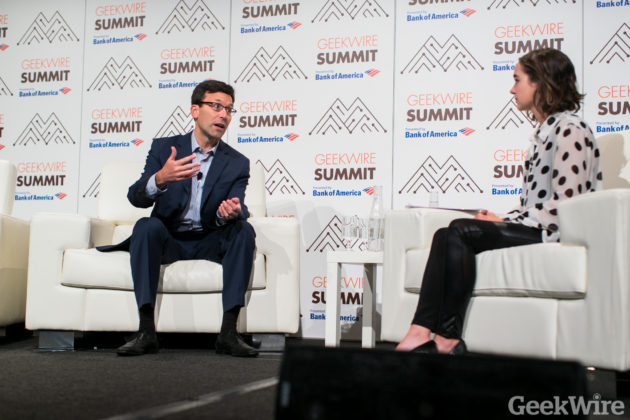
Nickelsburg: But you have held a pretty important executive office in the past. I recently learned that you were student body president at the University of Washington.
Ferguson: I was, yeah.
Nickelsburg: So the White House is the next logical step, right?
Ferguson: [laughing] Yeah, right, it’s a logical next step. My mom and dad are both graduates of the UW. When my father was alive, he was very proud I was student body president there. We’re big dawg fans, yeah.
Nickelsburg: I do want to talk more seriously about your history, because you were part of the Jesuit Volunteer Corps. Your uncle was a Catholic priest. You could have ended up on a very different career trajectory, so how did your path become the law?
Ferguson: There’s no easy answer to that. I guess what I would say is that when I was in the Jesuit Volunteer Corps — think Peace Corps, but just through the Jesuits. They have a volunteer organization. So I spent a year in an inner city community directing an emergency services office. In doing that work, I felt I was helping people in that community. Food, shelter, clothing, utility bills. But it did feel like I was helping provide a band-aid to the problems. Important, but it was a band-aid, to get them through another day or another week.
There was a legal clinic in my neighborhood where I was working, and I didn’t get to know those lawyers well. I just had the feeling and the sense that those lawyers were addressing social justice issues, socio-economic imbalances in a more fundamental way than I could in the work that I was doing, and I thought — That helped prompt me to go to law school. In terms of the work that I do, look, I’m just not someone who’s interested in money at all. It drives my wife a little crazy at times, to be honest, but I just don’t have — material things have no interest to me. I used to drive a 1993 Honda Civic. That was my car until about a year and a half ago when a teenager ran a red light and totaled it. Which, you know your car is old when the person who totals your car is actually younger than the car itself. That’s a sign, right?
Nickelsburg: That’s another thing you have in common with John. He has a crazy old Honda.
Ferguson: When I called my wife — She hated that car. We’ve got kids, the kids couldn’t be in the car. When I called her up from the accident scene, she asked how I was, I said fine. She says, “How’s the car?” I said, “Well, I think it’s totaled.” There was a pause and she said, “Are you sure?” I said, “Yeah. Yeah, it’s gone.”
But I’m just that way. For me, what interests me in life is my family and using the law to help people in my state. Those are really the things I’m focused on.
Nickelsburg: I have one more question for you and then we’re going to open it up to audience questions. So be thinking about questions you might have, and if you do have a question, just raise your hand and we’ll have a mic runner come over to you. But before we do that, I want to talk a little bit about elections. Big tech companies like Google, Facebook, Twitter, they’re in the news right now for the role that they played in enabling Russians to meddle with the 2016 election. They were able to buy hundreds of thousands of ads, political ads, and then also spread fabricated news stories. What kinds of protections do you think should be in place to govern the spread of political information on social media, especially if it comes from a foreign power?
Ferguson: Yeah, I’m not sure I’m the expert on that, to be perfectly honest. I’ve got my hands full with some things that are going on at the national level right now. That said, I’m deeply concerned about what I see, as everybody is. The ability of foreign governments to potentially influence elections. So, I don’t pretend like I’ve got the answers on that. I’m looking to our members of Congress at the federal level, as they enact laws and protections for that. I think it’s a challenge for the industry. That cannot be easy. I can only imagine what that’s like, trying to oversee that type of information. But I don’t pretend to be the expert on having the solution on how to address that.
Nickelsburg: Okay. Does anybody in the audience have a question? Nobody? I don’t see any hands out there. Oh, over here, maybe?
Audience Question: Hi, AG Ferguson. Great talk. Back to Trump for a second. You’re obviously part of the administration, and the state administration. What are the most important things the rest of us can do, both through the political process and outside of the political process, with regard to the depredations of the Trump administration?
Ferguson: That’s interesting. I guess this is what I would say. This is just my personal view. I think this is a dark time for our country. I believe that. But wherever one stands on the political spectrum, it is undoubtedly a pivotal time for our country. There’s a lot going on, to your questions. What I often say to people is: “It’s just not a time to be on the sidelines.” Everybody has a different role they can fill. As attorney general, I have a specific set of tools I can use, and I thank God every day I have the job that I have. I really do. But everybody has a role. Protest. Letters, speak to your members of Congress. Engage in some way. Volunteer. Wherever you land on these issues. And I think that’s the most important thing.
There is a power behind grassroots activism. That first travel ban — when it came out, as you all know, people were at Sea-Tac airport and airports all around the country, protesting. Without any doubt, that helped raise the profile of that issue and gave it a sense of urgency and helped educate people. That travel ban was popular when it was first enacted by the president. Much less so now, due, in no small part, because people got engaged. Yes, lawyers filed lawsuits to stop it, but there was activism on many, many levels from people all across our country that made a big difference.
That’s my view: People just need to be engaged in whatever way works for them. It’s different for everybody, but it’s no time to be on the sidelines.
Audience Question: Shifting back to privacy. I think last week, we heard FDIC and Yahoo both had headlines on breaches. When are we going to see either a designated jailee or meaningful fines? And by meaningful, I mean in the mega-millions, to push companies to protect our data Or else, can we just follow the EU?
Ferguson: Look, do I think in general that the potential fines that can be levied when there are really egregious breaches of personal information are too low? Yes. I’ll give you an example, in Washington state. I wish I had the exact numbers on my fingertips, but for corporate crimes in Washington state, the penalty for that has not been updated in … I hope I’m not exaggerating, but I think it’s literally 40 years. I’m really not exaggerating. There was a bill proposed by Mike Pellicciotti, a legislator down in the 30th district in Federal Way, proposing to just bring it up with cost of inflation since that time. Didn’t go anywhere in the legislature.
And that’s just in Washington state. Then you’ve got it, to your point, on the national side as well. I don’t have an easy answer for you, but any time in Washington State we propose something like that, you’re going to have a lot of opposition to it. Legislators are often — politicians are often — hesitant to take on powerful interests who are not playing by the rules. That’s just my view on it.
No easy answer on that. I’d write to your members of Congress and encourage them on your views on that. I enforce the laws that are on the books, that’s my job.
Audience Question: Did I hear you say correctly that you thought DACA protections would not be rolled back? And if so, can you expound on that?
Ferguson: Sure. As you know, when the president made his announcement rolling back protections for DACA, he gave a deadline of March, basically. If Congress didn’t act, he would then roll back those protections. I can’t say I’m wildly optimistic that Congress will act, so we filed a lawsuit the next business day, challenging the president’s authority to roll back those protections. We have a hearing in January. We’ve joined up with other states as well on that, and so I’m optimistic about our lawsuit.
One thing to keep in mind on that — it’s a complicated case, as all these cases are. But when Attorney General Sessions went forward before the country to announce rolling back protections for DACA and the president announced it, the basis for their decision, what they said was, “Well, DACA itself is illegal. DACA’s illegal, therefore Congress, you need to act. Congress has to act or we’re going to let it run its course.” There’s just one problem with saying DACA is illegal: No court has ever reached that conclusion. And I mean not one. Us lawyers care about these details.
So first, if anyone ever tells you DACA’s illegal, just ask them to tell you what court held that. No court has. Number two, the Department of Justice, which of course the attorney general leads, up until that announcement has been defending DACA as constitutional and as lawful. That’s been the position of the federal government since DACA was implemented. What changed? New president, new attorney general. But nothing else changed. And these points matter in a court of law.
Now, are any of these cases easy? Of course not. These are complicated, complicated cases. But I think I’m optimistic with our lawsuit, or I would not have filed it. And then more globally — look, I mean, within the contentious area of immigration, where there are strong views on both sides, DACA is wildly popular. I’ve seen polls that upwards of 80% of Americans support it. For good reason, right? These are individuals who came to our country as children through no fault of their own. Why on earth would we deport them to a country they don’t know? It makes no sense. So, I’m hopeful on the political side, but I’m focused on the legal side, and would not have filed the lawsuit unless I thought we could stop what the president was doing.
Nickelsburg: Well, thank you so much for being here.
Ferguson: Thank you so much for having me. I really appreciate it.
Conclusion: So above is the Washington AG Bob Ferguson talks Trump, reining in Big Tech, and rumors of a gubernatorial bid article. Hopefully with this article you can help you in life, always follow and read our good articles on the website: Ngoinhanho101.com

